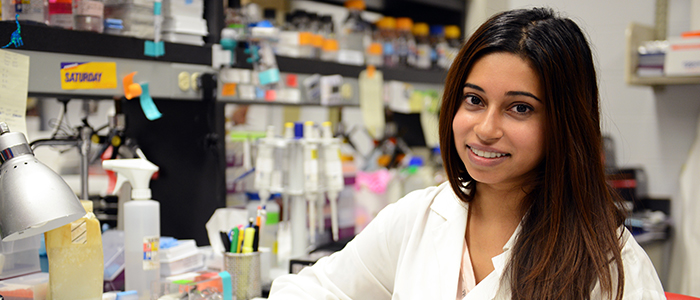From bedside to basic research

After completing an undergraduate degree in kinesiology at McMaster University, Anusha Ratneswaran worked as a kinesiologist in cardiac rehabilitation in Toronto.
Several patients she saw had musculoskeletal problems such as osteoarthritis and fibromyalgia, which made them unable to gain the benefits from fully participating in the program.
“Even though many patients were able to progress through the cardiac rehabilitation program, musculoskeletal health problems were one of the most prevalent barriers to exercise that patients faced,” Ratneswaran explained. “Seeing those barriers first-hand was really interesting for me.”
Inspired to learn more, Ratneswaran pursued a long path to a PhD with the Department of Physiology and Pharmacology. Working with her supervisor Frank Beier, PhD, Ratneswaran is researching a nuclear receptor called PPARdelta, which is involved in osteoarthritis. The majority of her research has been characterizing PPARdelta’s role in osteoarthritis.
One in 10 Canadians are affected by osteoarthritis, so esearch on the disease is tremendously important. Depending on the patient, and how far advanced the disease has progressed, the treatment for end-stage osteoarthritis is usually joint replacement.
“We have found that activating PPARdelta is bad and promotes osteoarthritis, whereas when we’re able to block this receptor genetically we’ve seen a delay in the progression of osteoarthritis,” she said. “Right now there are no drugs that stop or delay the progression of this disease, so if this target is feasible pharmacologically, it would have a significant impact on many people.”
Ratneswaran has already received several awards for her research, including a prestigious Collaborative Scholarship from the Osteoarthritis Research Society International in 2014, and a Gold Medal at the 2015 Canadian Student Health Research Forum. She said it is motivating and flattering to be recognized for her work, when so much of what she and her colleagues do is behind the scenes.
“It’s really exciting when you receive feedback from your peers, and even respected scientists you’ve only read about on paper,” she said. “These awards have also led to amazing opportunities for me, like travelling to Winnipeg or Australia, which I wouldn’t have been able to do otherwise.”
Beier believes Ratneswaran has great potential as a researcher, which stems from her many talents and dedication to make the lives of patients better. He has always been inspired by her always positive, “can-do” attitude.
“No matter how much work she has to do and how many deadlines she needs to juggle, Anusha always maintains great spirits, gets her tasks done, and does a tremendous job mentoring junior students along the way,” Beier said. “Even more impressively, she usually manages to have fun while doing her experiments, which is truly inspiring.”
Beier added that he hopes Ratneswaran will continue to do research, particularly in the field of osteoarthritis.
“Osteoarthritis is an extremely important but under-studied disease, and we are in desperate need of researchers like Anusha who understand both patient needs and basic research,” he said.








